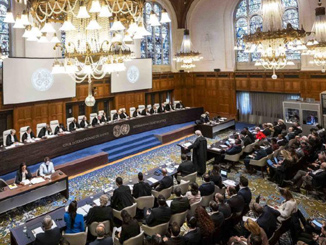

by Imtiaz Popat
Israel appeared before the International Court of Justice in The Hague and rejected accusations it is committing genocide in Gaza in a case that could impact the trajectory of the war.
South Africa, brought the case to the ICJ, alleges that Israel is violating international law by committing and failing to prevent genocidal acts “to destroy Palestinians in Gaza.” Bangladesh, Bolivia, Iran, Jordan, Maldives, Morocco, Namibia, Nicaragua, Pakistan, Saudi Arabia, Turkey and Venezuela have joined in supporting the case.
Israel has rejected the allegations — as has its most important ally, the United States.
The ICJ case adds to international pressure on Israel to scale back or end its war against Hamas, which health officials in Gaza say has killed more than 23,000 people — many of them women and children — rendered much of the enclave uninhabitable and pushed the population to the brink of famine.
Israel launched the campaign after Hamas militants rampaged through Israeli communities Oct. 7, killing around 1,200 people and taking more than 200 hostages.
After hearings Thursday and Friday, judges are expected to rule within weeks on interventions South Africa has requested to change Israel’s conduct of the war.
A verdict on the question of genocide could take years.
Here’s what to know What is the ICJ, and what authority does it have?
The International Court of Justice, established after World War II to settle disputes between countries, is the main judicial body of the United Nations.
The U.N. General Assembly and Security Council elect the court’s 15 judges to nine-year terms.
Its president is Joan Donoghue, a former legal adviser to the State Department.
A 1948 convention, ratified after the Holocaust, made genocide a crime under international law and gave the ICJ the authority to determine whether states have committed it.
The court’s rulings are legally binding, but enforcement can be tricky and they can be ignored.
Russia, for example, rejected a 2022 order to cease its war against Ukraine.
The ICJ is distinct from the International Criminal Court, a newer body that tries individuals accused of violating international laws including war crimes and genocide.
Neither Israel nor the United States recognizes the ICC’s jurisdiction.
